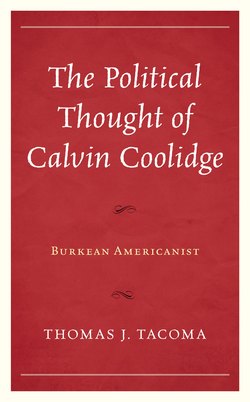Читать книгу The Political Thought of Calvin Coolidge - Thomas J. Tacoma - Страница 14
На сайте Литреса книга снята с продажи.
Philosophic Roots of Progressivism
ОглавлениеThe intellectual ferment at the end of the nineteenth century that ultimately gave birth to the Progressive movement grew out of several new philosophic doctrines. Many of these philosophies were imports to the United States from Europe, as American students traveled to German universities for graduate education and then returned to the States to teach and take over leadership roles in politics and public life. Such were the Hegelian historicist ideals brought into the United States through Johns Hopkins University, for example, or the positivist philosophy of Auguste Comte.[15] Other philosophies were homegrown or developed in conversation with English political thought. Charles Darwin’s biological theory was modified by social philosophers—namely Herbert Spencer in Britain and William Graham Sumner in the United States—to produce a social Darwinist philosophy.[16] Slightly later chronologically but ultimately more influential in the twentieth century was the pragmatic philosophy articulated by William James and John Dewey in the United States.[17] Finally, added on and mixed throughout all of these was the social gospel theology developed and promoted by the likes of Washington Gladden and Walter Rauschenbusch.[18] By turning man’s gaze away from eternity and individual salvation and toward a social redemption of humanity, the social gospel preachers were able to tap into the reform spirit of the era and lend their theological credentials to its political leaders.
These new ideas require some explanation in order to make sense of the Progressive movement as a coherent critique of existing conditions and then as a political movement. In order of relative priority for the Progressives, the historical school (and its cousin, historicism), pragmatism, social Darwinism, positivism, and the social Gospel each contributed something vital and unique to the Progressive ferment. Each philosophy in its origins, chief principles, and influence contributed to the agitation for reform from 1890 to 1920.
